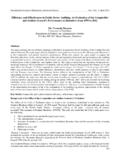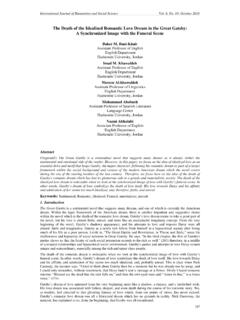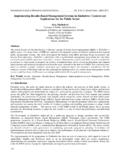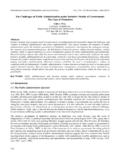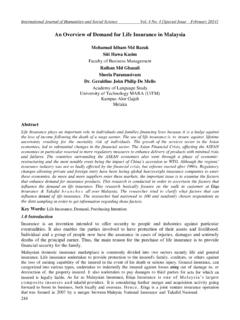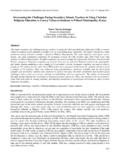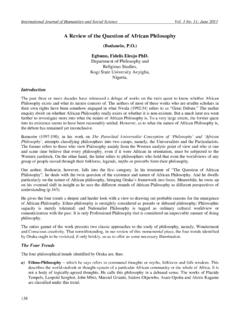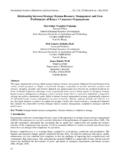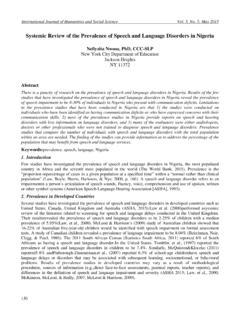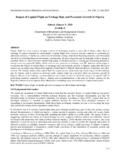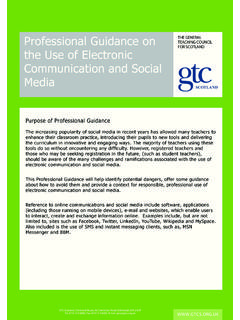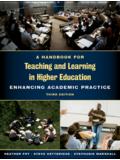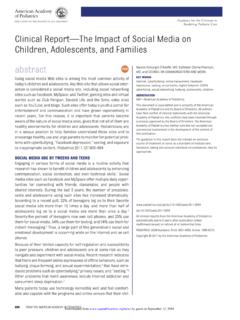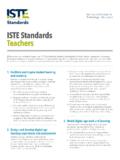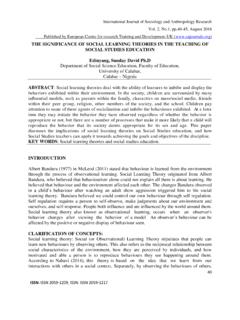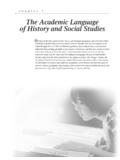Transcription of Freedom in Teaching and Learning - ijhssnet.com
1 International Journal of Humanities and social Science Vol. 3 No. 2 [Special Issue January 2013] 142 Freedom in Teaching and Learning Ahmed A. Osman Moi University, School of Education Department of Curriculum, Instruction & Educational Media Box 3900, Eldoret, Kenya Abstract Academic Freedom is a security against hazards to the pursuits of truth by those persons whose lives are dedicated to conserving the intellectual heritage of the ages and to extending the realm of knowledge. The rights of the teachers to teach truthfully and employ their reason to the full extent of their intellectual powers. Academic Freedom is the Freedom of professionally qualified persons to inquire, discover, publish and teach as they see it in their field of competence, without any control or authority of rational methods by which truth is established.
2 Academic Freedom is essential to the fulfillment of the purpose of the school. Teachers should be protected from censorship or restraint that unreasonably interferes with their obligation to expose students to controversial issues and to help students express their own views on such issues. The teacher s responsibility should be to show objectivity to see that various sides of controversial issues are given. To carry out this responsibility the teacher should be well informed in the areas being studied. It s recognized that every teacher has the right to a point of view and to express that view, but the teacher has the responsibility to tell the students that the statement is a personal view. Key words: Freedom , democracy, censorship, education, liberation, dialogue Introduction Traditionally academic Freedom refers to the liberty of the person to carry out investigation in a scholarly manner within the structure of the academic community.
3 It is narrowly defined as the Freedom of professionally qualified persons to inquire, discover, publish and teach the truth as they see it in the field of their competence, without any control of any authority except the control of the authority of the rational methods by which truth is established (Worgul, 1992, p. 10). It is this definition that serves as a model for much of the discussion today. When considered this way the process includes; The unhindered Freedom to explore a given subject to the extent that the rational powers of investigation are capable and the Freedom to do so without influence or pressures to external process. The development of thought or divergent view on a given subject, but at some point in dialogue, discussion, and even disagreement.
4 The obligation of the teacher is to direct to truth and the teacher who is in order to please anybody, suppress important information or saying things he \ she knows are not true or refrains from saying things needs to be said in the interest of truth, betrays his calling and renders himself unworthy to belong in the company of teachers. If we desire to preserve any institution or concept on first necessity is to define our terms correctly and to ascertain accurately the causes of discontent. But the problems are as pressing in the school as they are in the colleges. The schoolteacher enjoys far less Freedom of opinion and actions as the college professor. If academic Freedom is to be sustained and restored, probably the emerging leadership for such accomplishment must be discovered (Kirk, 1978).
5 Arney and Finkel, (1995) state that the teachers who set their students free through education find themselves in a puzzling and problematic situation. Teaching Freedom is a paradox, the paradox of pedagogy. They use Russeau s Emile on setting the stage for designing education for Freedom and liberation. The true individual must be so well disciplined to choose wisely and freely for himself and for others to. This teacher must regulate the student s Freedom even as he gives it to him. A healthy mind, a functioning and a free mind is not a mind which believes as it pleases ( Tussman, in Arney and Finkel, 1995, p. 56). The Special Issue on Contemporary Research in Behavioral and social Science Centre for Promoting Ideas, USA 143 The goal of individual education is good government.
6 Individuals must develop the authority to govern themselves and develop a responsiveness to the authority of other individuals sufficient to allow them to form a well-governed, enriching collective. This paper will focus on academic Freedom in the schools. It will explore the extent schools can maintain and nurture free speech to discuss ideas that are helpful to discourse. It will discuss the role of the teachers and the students in carrying out dialogue that is meaningful. The concepts of dialogue, language and the role of the teacher will be discussed and how all these compliment one another in guiding the child to grow up and take part in a meaningful Freedom in the classroom. The Role of Academic Freedom Academic Freedom is the process that draws on the creative energy of the teachers, students and the school administration in developing a unique vision for the institution.
7 It is the promise by an educational community that scholarly issues are openly discussed, and debated regardless of how controversial or unpopular the views expressed. Academic Freedom in its Teaching aspects is fundamental for the protection of the rights of the teacher in Teaching and of the students for their Freedom to learn. Schools should be committed to protecting the rights of free speech in a meaningful sense of the term without coercion or hindrance. The school administration should allow free exchange of ideas to flourish. The teachers, students and the school administrators should have respect for the rights of all individuals to speak their views freely and be heard. They must refrain from any action that would cause that right to be abridged or curtailed.
8 The purpose of the school is to facilitate Learning and it must guard its environment from disturbing influences, which might tend to inhibit Learning . Teachers must be free to select, recommend and assign those Learning materials that are significant to the students and appropriate to their maturity. The selection of instruction materials and the reconsideration of these materials should include objectives critical for selection and procedures for handling complaints (Kean, 1994). Dialogue in Education Dialogue in education is necessary for one to think, speak, read, and write freely. External pressure and controls hinder the individuals healthy growth as a human being. Moreover the need for dialogue and Freedom as bell hooks has pointed out, is one of the simplest way we can begin as teachers, scholars, and critical thinkers to cross boundaries, the barriers that may or may not be erected by race, gender, class, professional standing and a host of other dialogue is meant to serve as a model for critical exchange between male and highlighting powerful moment when boundaries are crossed, difference confronted, discussion happens and solidarity (hooks, 2000, ).
9 Hooks is clearly stating that for meaningful dialogue to take place we have to tread on a shaky ground where no one has dared before. This means that the discourse may lead us to a controversial issue that may involve our emotions and there will be no longer any reasoning. Greene (1995) asserts that authentic dialogue among educators is necessary so that their voices are heard with greater clarity. The voices of those who engage with the young in their concreteness and particularly the teachers should use the children stories to break through class polarization. She further says that, This change has not broken through into public space, where we the teachers are very seldom inclined to speak voluntarily for no matter what our personal inclinations, teachers especially can no longer obliterate the diverse voices, unashamed of their distinctiveness, speaking life stories and cultural stories sometimes adds with or comptemptous of the sacred writs of mainstream (p.)
10 170-71). Greene is saying that, it is those in authority who control the direction the dialogue should take and often teachers do very little to give a chance to those others voice their feelings. Greene(1988) is the opinion that to find such openings is to discover new possibilities-often new ways of achieving Freedom in the world. The ignorant, the uneducated, and some educated people have always threatened intellectual Freedom . They do not see clearly the precious nature of such Freedom and the necessity of the dialogue. They prize other values more such as national pride, conformity, and state security often retaining these values and letting the Freedom go in the event of any conflict. A school community that aspires to foster intellectual Freedom must encourage dialogue, for otherwise it will find itself with people who pay lip service to certain noble ideals and fail to develop in conduct.
